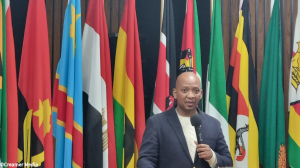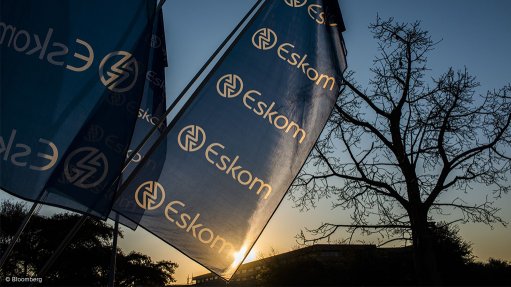DBSA hosts African delegates as govt drives energy investment mission

Gauteng Growth and Development Agency acting group CEO Saki Zamxaka shares the value of agencies that facilitate investment
With the African continent being home to the majority of the 700-million people worldwide with no access to electricity and clean cooking technology, energy investment in the region is deemed imperative for industrialisation and universal access to electricity, the Development Bank of Southern Africa (DBSA) has said.
The bank hosted delegates from various African countries at the Continental Energy Investment Forum, in Johannesburg, on July 15, during which it pointed out that about 43% of Africa’s population lacks access to reliable electricity.
Embassy, government and private-sector representatives present at the event hailed from Angola, the Democratic Republic of Congo, Egypt, Ghana, Kenya, Mozambique, Nigeria, Uganda, Zambia and Zimbabwe.
Department of Trade, Industry and Competition (dtic) deputy director-general for exports Lerato Mataboge said the DBSA forum marked the start of the department’s Energy Inward Buying and Investment Mission from July 15 to 20, which the dtic is hosting in partnership with the Export Credit Insurance Company, the Industrial Development Corporation and the South African Electrotechnical Export Council.
The mission comprises business-to-business meetings and site visits to key South African manufacturing companies and utilities to showcase the country’s capacity and efforts to achieve sustainable energy development.
With African delegates presenting their own country’s energy projects, the mission is expected to result in South African producers identifying energy projects that can benefit from procuring South African energy efficient products, engineering services and technology.
Currently, South Africa has a market share of between 7% and 16% in six African countries for electrical engineering goods; however, through accelerated trade efforts being facilitated by the African Continental Free Trade Area (AfCFTA) Agreement, Mataboge said South Africa is seeking to double its market share of electrical engineering goods and services in existing partner countries, as well as new markets.
She mentioned that the electrotechnical industry in South African is valued at $58-billion and employs about 280 000 people.
Mataboge anticipated more meaningful financing and development opportunities emerging on the continent, particularly as the African Union drives its action plan for boosting trade and industrial development in Africa.
Gauteng Growth and Development Agency (GGDA) acting group CEO Saki Zamxaka opened DBSA’s forum by highlighting how sustainable energy had become a global focus and, in Africa’s case, could serve as an enabler of growth.
He mentioned the importance of more localised technology and solution development for conditions in South Africa and all other African countries, with due regard to the renewable-energy resources that were available in each country.
More energy investment would not only narrow the gap in energy access on the continent, but also create jobs and opportunities for skills development, Zamxaka stated.
He added that there was a need for more agencies such as the GGDA on the continent to facilitate business relations, particularly to fast-track regulatory processes, since GGDA works closely with the dtic.
Meanwhile, energy investment had become a key focus area for the DBSA, with the bank recognising that energy was critical in the development of any economy, said DBSA chief risk officer Mpho Kubelo.
The DBSA keeps track of energy investment on the continent together with consultancy Africa House, which has a database of all major renewable-energy projects being built or having been built in Africa.
The bank offers financing for the development of energy technologies, energy generation, transmission and distribution projects.
Its investment is aimed at ensuring greater access to electricity on the continent, particularly in sub-Saharan Africa, as well as to cater for energy demand that is poised to double by 2050 owing to population growth.
Kubelo said solving the energy crisis would help countries meet national, regional and global objectives outlined in the National Development Plan 2030, Infrastructure Vision 2027, Regional Infrastructure Development Master Plan and the Sustainable Development Goals.
Apart from financing, the bank also offers arranging and underwriting services, subordinated debt instruments, blended finance, guarantees and first loss instruments, as well as black economic empowerment funding.
To date, the DBSA has committed funding to 36 projects in South Africa’s Renewable Energy Independent Power Producer Procurement Programme, valued at more than R17-billion.
Official marketing agency Brand South Africa marketing GM Lefentse Nokaneng said the AfCFTA Agreement has opened up substantial trade pathways, including in renewable energy.
He admitted that South Africa, like many other African countries, had infrastructure challenges but said partnerships between government and the private sector had helped to improve the efficiency of energy and port utilities, as well as ensured the realisation of major infrastructure projects.
Added to this has been socioeconomic transformation and programmes to improve the economy, in South Africa’s case.
The country is often a catalyst or entry point for investment into other African countries.
Nokaneng said the AfCFTA further enhanced the South African value proposition, while addressing longstanding issues such as ageing border infrastructure and complex regulatory environments across the continent.
South Africa shipped its first consignment of products under the AfCFTA Agreement from Durban on January 31 this year, having heralded the start of a potential wave of crossborder trade and investment.
Article Enquiry
Email Article
Save Article
Feedback
To advertise email advertising@creamermedia.co.za or click here
Press Office
Announcements
What's On
Subscribe to improve your user experience...
Option 1 (equivalent of R125 a month):
Receive a weekly copy of Creamer Media's Engineering News & Mining Weekly magazine
(print copy for those in South Africa and e-magazine for those outside of South Africa)
Receive daily email newsletters
Access to full search results
Access archive of magazine back copies
Access to Projects in Progress
Access to ONE Research Report of your choice in PDF format
Option 2 (equivalent of R375 a month):
All benefits from Option 1
PLUS
Access to Creamer Media's Research Channel Africa for ALL Research Reports, in PDF format, on various industrial and mining sectors
including Electricity; Water; Energy Transition; Hydrogen; Roads, Rail and Ports; Coal; Gold; Platinum; Battery Metals; etc.
Already a subscriber?
Forgotten your password?
Receive weekly copy of Creamer Media's Engineering News & Mining Weekly magazine (print copy for those in South Africa and e-magazine for those outside of South Africa)
➕
Recieve daily email newsletters
➕
Access to full search results
➕
Access archive of magazine back copies
➕
Access to Projects in Progress
➕
Access to ONE Research Report of your choice in PDF format
RESEARCH CHANNEL AFRICA
R4500 (equivalent of R375 a month)
SUBSCRIBEAll benefits from Option 1
➕
Access to Creamer Media's Research Channel Africa for ALL Research Reports on various industrial and mining sectors, in PDF format, including on:
Electricity
➕
Water
➕
Energy Transition
➕
Hydrogen
➕
Roads, Rail and Ports
➕
Coal
➕
Gold
➕
Platinum
➕
Battery Metals
➕
etc.
Receive all benefits from Option 1 or Option 2 delivered to numerous people at your company
➕
Multiple User names and Passwords for simultaneous log-ins
➕
Intranet integration access to all in your organisation


















